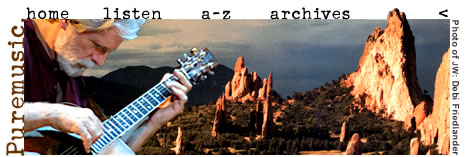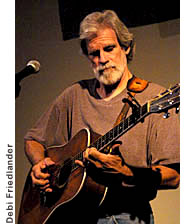
A Conversation with Jack Williams (continued)
JW: So music-wise, Nashville's crowds are tough for me. And I've enjoyed some gigs there. I used to play the Radio Cafe some. I played Douglas Corner several times. I know Mervin. I used to do the Bluebird a little bit, and finally played there long enough to where she'd pay me.
PM: [laughs]
JW: There's always hope for an audience. But that's something you're going to have to face, if you think about doing house concerts in Nashville, is the fact that you have an audience attuned to something else in the music, rather than just sitting back closing their eyes. Because a lot of folk singers are going to tell about things that matter to them. And most people say, "Well, shit, what do I want to hear about Arkansas for? What do I want to hear about this for? This is not what I want." But the thing is, the great storytellers, as they tell about Mom and Pop in Arkansas, or whatever, they are able to shed light on other things in the world.
PM: Right.
JW: And that's the beauty of it and the universality of it. And I just have a hard time when I go somewhere and I realize that I'm being listened for something different. And it has an effect on me. It makes me say, "Well, shit, I ought to play something that's just..." You know, in other words, I feel like dumbing down. And so I quit playing there. [laughs] And I feel bad about that, because I think, shoot, here's a great down where people have got all of the trappings and the accouterments of music accessibility, and yet no one is listening.
And then there are the people who sit there with their pencils and paper while you sing. Well, I watched them--when David Olney used to play, or Walter Hyatt used to play, there would be people sitting out there taking notes. And I always used to fantasize that it was people who were well-steeped in what it took, and who were willing to do what it took, to write the right kind of songs, whatever it took to make it, make it, make it. And they were there saying, "Why is everybody here listening to this guy? What the hell has he got? Why is he getting a Linda Ronstadt cut?" And they're writing notes. And then Walter Hyatt was up there and, well, they couldn't grasp it. They could not grasp what was going on. They were looking and... [laughs]
One of my favorite stories about being in Nashville was when I went to the Tree Publishing Company. And as I was leaving, after I played some stuff for the president, when we finished our session and we went over to the elevator--I was just feeling around in the late 80s, early 90s, trying to figure out whether or not a publishing deal were possible for me. I had a bunch of songs that I wasn't going to do anything with. I mean, I had hundreds. And the doors opened pretty easily. I'd already had a cut by one major artist, so people thought, "Well, here's a geezer with several hundred songs, and one cut, and we might as well listen to him."
So that happened at Tree. And as we were leaving, I heard four guys in an office playing "Here Comes the Sun" by George Harrison. And I went in the elevator, and the elevator door closed. And I asked the guy what those four guys were doing playing "Here Comes the Sun." And he said, with all seriousness, "Those men are in there distilling the essence of that song, trying to find what made that song. And they will all go their separate ways and probably create just wonderful music out of it." And I just was dizzy with this answer. It just spun me in circles.
PM: Deconstructing the Beatles.
JW: Yeah, deconstructing to find out what it's like. In other words, these guys don't have anything to offer. Which made me think that they probably do have something to offer, but they were never given a chance to find out what the heck it was. They probably never had a chance to play for people who actually listened to what they had to say, and they never had a chance to express themselves freely without thinking that there's a commercial constraint here.
PM: As if songwriting were a matter of reverse engineering.
JW: That's right, exactly. Well, that's what happens with music theory, when people say, "I'm going to do better. I'll play and sing better if I just get some theory." But theory is where somebody sat and listened to the way things had been done to this date and put it down in a book and said, "Okay, now, here's how it's done." That's all theory is. Because there are no rules, god dammit, and we choose at the moment we're writing what constraints we want on us. I can write a song, and I can go to some ugly corner, write some ugly word if I want to. Of course, it may not be listened to, so there's my constraint. I decide whether I want it to be heard, and how I want it to be heard. And then I have the constraints of my own artistic sensibilities. Can I live with this? If I change this one word in this song, my favorite word in the song, if I change it, maybe I can get somebody to cut it.
PM: [laughs]
JW: And so do you change the word? And then there are those who try to straddle the fence and say, "Well, if I change that little phrase right there, I'll make a demo with it that way, but I'll sing it the real way."
PM: [laughs]
JW: But it's like, "Well, what is this? Is this real feeling in this song here, that's supposed to exist in the performance of it?" Anyway, this is a world that I've been dabbling in for a long time. I have too much to say on it, so...
PM: You're not only one of the best singer songwriters on the road, you're always a fascinating character on the subject of songs, of music, of audiences, and anything really connected with the process of music and music making.
JW: Well, I'm glad it has some interest to somebody, because it fascinates the heck out of me. What fascinates me too, and frightens me, is to think of just how many millions of people there are out there perfectly willing to go the way the media blows them. And then I have the gratification of playing a house concert--as you will have this weekend.
![]()
|
|
|
| print interview (PDF) | |
| listen to clips | |
| more clips | |
| jackwilliamsmusic.com | |
| photographers: | |
| robert corwin | |
| jim dirden | |
| debi friedlander | |
| debi's house concerts | |
| puremusic home | |
